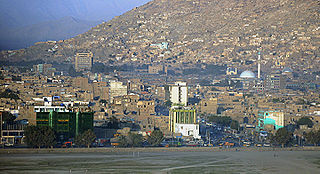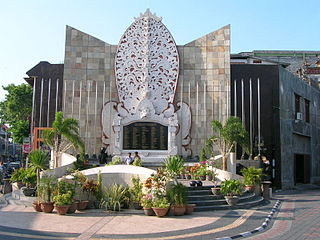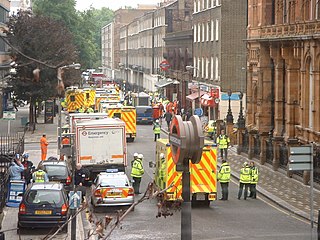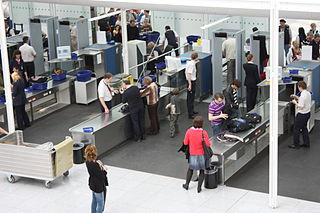
This article describes international reactions to the prelude to Iraq War prior to the 2003 invasion of Iraq. The positions of national on the war may have changed since the invasion.

United Nations Security Council resolution 1566, adopted unanimously on 8 October 2004, after reaffirming resolutions 1267 (1999), 1373 (2001) and 1540 (2004), the Council condemned terrorism as a serious threat to peace and strengthened anti-terrorism legislation.

The war on terror, officially Global War on Terrorism (GWOT), is a global military campaign initiated by the United States following the September 11 attacks in 2001, and is the most recent global conflict spanning multiple wars. Some researchers and political scientists have argued that it replaced the Cold War.

United Nations Security Council Resolution 1637, adopted unanimously on 8 November 2005, after reaffirming previous resolutions on Iraq, the Council extended the mandate of the multinational force until the end of 2006.

The September 11 attacks were condemned by world leaders and other political and religious representatives and the international media, as well as numerous memorials and services all over the world. The attacks were widely condemned by world governments, including those traditionally considered hostile to the United States, such as Cuba, Iran, Syria, Libya, North Korea, and Afghanistan. However, in a few cases celebrations of the attacks were also reported, and some groups and individuals accused the United States in effect of bringing the attacks on itself. These reports have been uncorroborated and many have been linked to unsubstantiated conspiracy theories.

United Nations Security Council resolution 1044, adopted unanimously on 31 January 1996, after noting the assassination attempt on President of Egypt Hosni Mubarak at an Organisation of African Unity (OAU) summit in the Ethiopian capital Addis Ababa on 26 June 1995, demanded that the Government of Sudan comply with OAU requests to extradite suspects sheltered in the country to Ethiopia.

United Nations Security Council resolution 1189 was adopted unanimously on 13 August 1998. In the resolution, after expressing its deep disturbance at the bombings in Nairobi, Kenya, and Dar es Salaam, Tanzania, on 7 August 1998, the Council strongly condemned the terrorist attacks and called on countries to adopt measures to prevent further incidents.
United Nations Security Council resolution 1269, adopted unanimously on 19 October 1999, after expressing concern at the increasing number of acts of international terrorism, the Council condemned terrorist attacks and called upon states to fully implement anti-terrorist conventions. It was the first time the Security Council had addressed terrorism in a general manner, though it did not define what constituted terrorism.

United Nations Security Council resolution 1368, adopted unanimously on 12 September 2001, after expressing its determination to combat threats to international peace and security caused by acts of terrorism and recognising the right of individual and collective self-defense, the Council condemned the September 11 attacks in the United States.

United Nations Security Council resolution 1378, adopted unanimously on 14 November 2001, after reaffirming all resolutions on the situation in Afghanistan, including resolutions 1267 (1999), 1333 (2000) and 1363 (2001), the Council affirmed that the United Nations would play an important role in the country and called for the establishment of a transitional administration leading to the formation of a new government.

United Nations Security Council Resolution 1438, adopted unanimously on 14 October 2002, after reaffirming the principles of the United Nations Charter and Resolution 1373 (2001), the Council condemned the bombings in Bali, Indonesia.

United Nations Security Council resolution 1450, adopted on 13 December 2002, after reaffirming the principles of the United Nations Charter and resolutions 1189 (1998), 1269 (1999), 1368 (2001) and 1373 (2001), the Council condemned the attacks on Israeli targets in Kikambala and Mombasa, Kenya on 28 November 2002.

United Nations Security Council resolution 1511 was adopted unanimously on 16 October 2003, after reaffirming previous resolutions on Iraq, particularly 1483 (2003), 1500 (2003), and Resolution 1373 (2001) on terrorism. The council urged countries to contribute towards a multinational force to maintain security and called for power to be returned to the Iraqi people as soon as possible.

United Nations Security Council resolution 1516, adopted unanimously on 20 November 2003, after reaffirming the principles of the United Nations Charter and Resolution 1373 (2001), the council condemned the bombings in Istanbul, Turkey on 15 and 20 November 2003.
United Nations Security Council resolution 1526, adopted unanimously on 30 January 2004, after recalling resolutions 1267 (1999), 1333 (2000), 1363 (2001), 1373 (2001), 1390 (2001), 1452 (2002) and 1455 (2003) concerning terrorism, the council tightened sanctions against Al-Qaeda, the Taliban, Osama bin Laden and associated individuals and groups.

United Nations Security Council resolution 1530, adopted unanimously on 11 March 2004, after reaffirming the principles of the United Nations Charter and Resolution 1373 (2001), the council condemned the train bombings in Madrid, Spain, on 11 March 2004. It was passed hours after the attacks.

United Nations Security Council resolution 1611, adopted unanimously on 7 July 2005, after reaffirming the principles of the United Nations Charter and resolutions 1373 (2001) and 1566 (2004), the Council condemned the 7 July 2005 London bombings.

United Nations Security Council resolution 1624, adopted unanimously at the 2005 World Summit on 14 September 2005, after reaffirming previous resolutions on terrorism, including resolutions 1267 (1999), 1373 (2001), 1535 (2004), 1540 (2004), 1566 (2004) and 1617 (2005), the Council called on all states to co-operate in order to strengthen the security of their international borders by enhancing terrorist screening and passenger security procedures.

United Nations Security Council Resolution 1735, adopted unanimously on December 22, 2006, after recalling resolutions 1267 (1999), 1333 (2000), 1363 (2001), 1373 (2001), 1390 (2001), 1452 (2002), 1455 (2003), 1526 (2004), 1566 (2004), 1617 (2005), 1624 (2005) and 1699 (2005) on terrorism, the Council approved measures to improve the identification and control of terrorists.

The 2017 Tehran attacks were a series of two simultaneous terrorist attacks that occurred on 7 June 2017 that were carried out by five terrorists belonging to the Islamic State of Iraq and the Levant (ISIL) against the Iranian Parliament building and the Mausoleum of Ruhollah Khomeini, both in Tehran, Iran, leaving 17 civilians dead and 43 wounded. The shootings were the first terrorist attacks in Tehran in more than a decade, and the first major terror attack in the country since the 2010 Zahedan bombings.


















